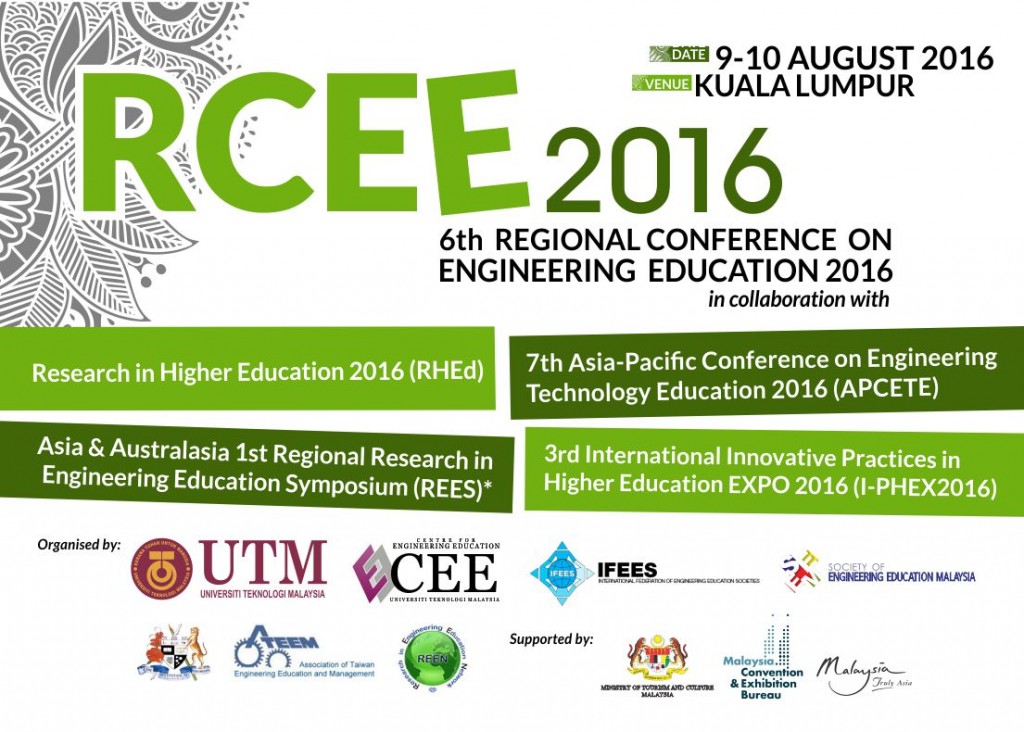
SPECIAL TRACK ON SERVICE LEARNING
Integrating Service Learning in a Community-Based Participatory Research: A Case Study of Centre for Advancement in Rural Education Informatics
Shahida Sulaiman
Current needs in higher learning institutions lead to the evolution of academia’s role from only focusing on teaching to actively involved in research and professional service that includes services to the community. The diversity in key performance index encourages academicians to be creative and innovative in order to link their research with a community’s needs through community-based participatory research (CBPR). Simultaneously, a CBPR has a potential to be incorporated with a service learning as part of teaching and learning strategy for a dedicated course. The case study of Centre for Advancement in Rural Education Informatics (iCARE), a project under the MoU between Universiti Teknologi Malaysia (UTM) and South East Johore Development Authority (KEJORA) provides an insight on the possibility to integrate service learning in a CBPR as part of university social responsibility (USR) to support rural education informatics. The case study involves a programme that adopts information and communication technology (ICT) to promote the interest and confidence in English communication among rural learners. The findings of the case study show the possibility of the integration with some challenges that researcher-cum-academician could ponder. This outcome reflects how academicians can integrate service learning in their CBPR related projects in order to share and transfer their knowledge, expertise and research at universities together with their students for the benefit of local community.
Engineering Mapping system for Service Learning Project
O Kaung Lim, Young Bong Seo, Ji In Eom, Min Jeong Jeong
Innovation Center for Engineering Education, Pusan National University, Korea
We have made various engineering service learning programs for undergraduate students of engineering major since 2009. Project BEE is one of them and BEE stands for beyond engineering education. Creativity Station’ is the creative convergence design education which involves engineering services based on different majors. The basic structure of service learning is divided into five parts based on topics with 29 detail missions. Participants should find problem and define solving issue to serve in local site. Students can refer to the schedule book to get information about various missions each project requires. Each team found out the most crucial issue of local village and defined the problem by themselves.
Main design process of each team can be checked in real time on website named ‘Engineering Mapping’.
Instilling Global Attributes Among Engineering Undergraduates through a Community-Based Service Learning
Aznah Nor Anuar
In the 21st Century, globalization and the growth of multinational companies throughout the world today means that the need for global workers or professionals is rising. People in different cultures may have different ways of thinking, norms, working, etc. Some language or behaviour may be considered perfectly acceptable in one culture, but inappropriate in another. As such, since the end of the 20th Century, there is an increasing trend for engineers to work in multi-cultural and multi-nation environments. There are several attributes reported under the brand of “Global Engineers” as early as 1997 under the Manifesto for Global Engineering Education, stated that global engineers not only have a good grasp of engineering knowledge and understanding but also have multidisciplinary perspective and understanding of interrelatedness of their expert area with others. They need to be able to appreciate other culture and the diversity, flexible, dynamic, have good communication and team-working skills. To develop global attributes of engineering graduates, four institutions from three Asian countries (Malaysia, Indonesia and Korea) had collaborated in service learning program in communities around Indonesia and Malaysia. Students from different countries were grouped together to identify local issues in the community. They then create and implement the solution. This paper presents the results of the study undertaken by University Teknologi Malaysia to investigate the impact of the program, with respect to the attainment of global engineers attributes. The research based on check-list survey and results comparison between participation of UTM students from 2013 to 2015, indicated that this intensive program, using the concept of a multi-cultural team for engineering service learning, can be implemented to instil global engineer attributes among students.
Cultivating Communication and Team-Working Skills to Undergraduates in Co-Curricular Service Learning
Dayang N. A. Jawawi
Co-curricular Service Learning (CSL) is one of the approaches that used community service experience in cultivating generic skills among undergraduate students. This paper describes an implementation of CSL approach. The experience of undergraduates involved in the CSL project was studied by analyzing their reflection on communication and teamwork skills after their involvement in the CSL programs. The findings of this study suggested that CSL has an impact on the cultivation of communication and teamwork skills among the undergraduates involved.
